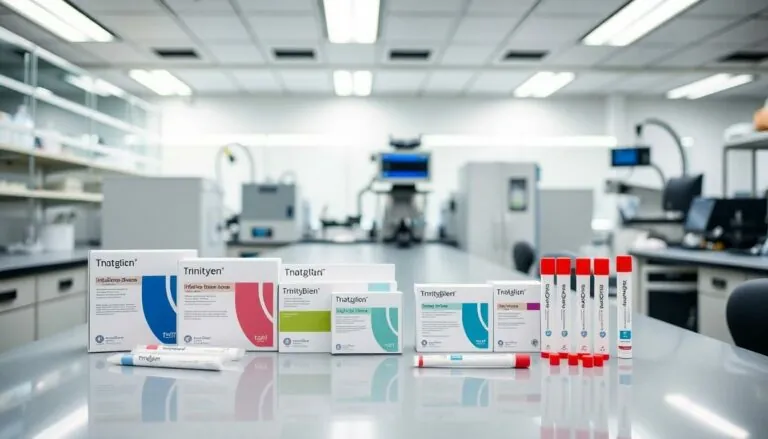Table of Contents
ToggleIn the fast-paced world of biotech, the excitement of initial public offerings (IPOs) can feel like a rollercoaster ride through a laboratory of innovation. Investors often find themselves asking: which biotech company will be the next big thing? With groundbreaking therapies and cutting-edge technologies, these IPOs promise not just financial returns but the chance to be part of something that could change lives—no lab coat required.
Overview of Biotech IPOs
Biotech IPOs represent a significant trend in the financial markets. Growth potential drives investor interest in these offerings. Promising companies frequently seek public funding to accelerate research and development. Many of these firms focus on innovative therapies that address unmet medical needs.
Numerous factors influence the success of biotech IPOs. Market conditions play a vital role in determining investor sentiment. Regulatory approvals can impact the timing and valuation of these offerings. A strong pipeline of candidates for clinical trials often attracts investor confidence.
Statistics reflect the importance of biotech IPOs. In 2021, biotech companies raised over $20 billion in IPOs, showcasing robust activity. Many investors recognize that early-stage investment in biotech can yield significant returns. Successful companies often establish themselves as industry leaders, paving the way for additional funding rounds.
Geographical factors also play a role. The United States remains a primary hub for biotech innovation, with major concentrations in California and Massachusetts. Numerous biotech firms are based in these regions, benefiting from access to top talent and research institutions.
Understanding the dynamics of biotech IPOs requires continuous monitoring. Trends in investment, technology, and regulatory landscapes shift frequently. Successful navigators of this space often incorporate both quantitative and qualitative analyses into their strategies.
Recent Trends in Biotech IPOs

Recent data showcases an evolving landscape for biotech IPOs. Companies are increasingly positioned to leverage public markets to fund innovative research and development.
Growth in the Sector
The biotech sector experienced significant growth, with IPO activity reaching new heights. For instance, in 2021, biotech firms raised over $20 billion through IPOs, indicating a strong investor appetite. This surge reflects growing confidence in the sector’s transformative potential. As novel therapies emerge, companies with promising clinical trial candidates attract substantial investments. Investors seek opportunities in firms that demonstrate robust development pipelines and strategic collaborations. Additionally, advancements in personalized medicine and gene therapies contribute to this sector’s expansion.
Market Reactions
Market reactions to recent biotech IPOs vary but often trend positively following successful offerings. After public listings, many biotech stocks see initial price increases driven by optimistic market sentiment. Analysts highlight that investor enthusiasm remains robust for innovative companies tackling unmet medical needs. Regulatory approvals also influence market behavior, typically boosting stock prices upon announcement. Notably, companies that communicate clear paths to profitability generate greater investor interest. Amid changing market conditions, investors remain focused on identifying firms with sustainable business models.
Notable Biotech IPOs in 2023
Several biotech companies made headlines in 2023 through successful IPOs, showcasing the industry’s dynamic landscape and investor interest.
Case Study: Company A
Company A debuted on the market in March 2023, raising $150 million. This biotech firm focuses on developing a groundbreaking gene therapy for rare genetic disorders. Initial trading reflected strong investor confidence, with stock prices increasing by 45% on their first day. Analysts highlighted the company’s innovative approach and promising clinical trial results, positioning it as a leader in therapeutic advancements. With a solid pipeline of candidates, Company A offers potential long-term returns for investors. Its strategic partnerships with major research institutions underscore the dedication to accelerating development timelines and maximizing therapeutic impact.
Case Study: Company B
Company B entered the public market in July 2023, achieving a remarkable $200 million in funding. This biopharmaceutical company specializes in novel oncology treatments. Investors responded positively, resulting in a 35% jump in share prices shortly after launch. The company’s focus on unmet medical needs resonated strongly within the investment community. Clinical data previews indicated high efficacy rates, drawing significant attention from analysts and investors alike. Company B’s commitment to research and collaboration with oncological experts enhances its potential to disrupt the market and deliver transformative therapies for patients.
Risks and Challenges of Biotech IPOs
Investing in biotech IPOs carries notable risks and challenges. Regulatory hurdles often pose significant obstacles during clinical trials. For instance, companies may face setbacks in securing necessary approvals from agencies like the FDA, impacting their financial outlook. Market volatility can also disrupt investor sentiment, leading to fluctuating stock prices. Biotech firms frequently operate in competitive environments, where advancements by rivals can diminish their market position overnight.
Clinical trial failures represent a major concern for investors. Failure to demonstrate safety or effectiveness in trials may lead to loss of funding and investor confidence. Unpredictable timelines further complicate the situation. Research and development can take years, delaying potential returns on investments. Additionally, the lack of established revenue streams in early-stage companies often raises red flags.
Data illustrates that only 10% of drug candidates receive FDA approval, underscoring the high stakes in this sector. Financial dependency on continued capital investment increases vulnerability. Biotech companies typically require substantial funding to support ongoing R&D, putting them at risk if public interest wanes. This reliance becomes particularly critical during market downturns when capital can be harder to secure.
Understanding intellectual property protection is essential. Firms must rigorously defend their patents, particularly in an era of heightened competition. Threats from generics and biosimilars can erode a biotech company’s unique market proposition. Moreover, investor education remains vital. Many potential investors may lack familiarity with the complexities of biopharmaceutical developments, which can affect their decision-making.
Finally, macroeconomic factors exert influence over the biotech IPO landscape. Economic downturns can lead to reduced investment appetites, impacting the ability of companies to go public or succeed post-IPO. Investor caution in uncertain times may limit opportunity. As these factors intertwine, they emphasize the necessity for thorough due diligence in biotech IPO evaluations.
Future Outlook for Biotech IPOs
Anticipated trends suggest a continued robust interest in biotech IPOs over the next several years. Increased investment in pharmaceuticals and biotechnology indicates an environment ripe for innovative discoveries. Market analysts point to strong pipelines and promising clinical trials, which typically enhance investor confidence. With successful launches, companies are likely to attract significant investment, sustaining enthusiasm for the sector.
In 2023, numerous biotech firms made successful IPO debuts, raising substantial funds. Company A raised $150 million through its IPO, while Company B secured $200 million, demonstrating the potential for high returns in early-stage investments. Initial stock jumps, with Company A increasing by 45% and Company B by 35%, exemplify investor excitement.
Growing demand for novel therapies drives the optimism surrounding biotech IPOs. Many investors demonstrate a keen interest in firms addressing unmet medical needs, especially as clinical trials yield positive results. Earlier statistics show that the biotech sector raised over $20 billion in IPOs within a single year, reflecting a strong appetite for investments.
Expert predictions underscore the importance of ongoing regulatory approvals in driving stock prices higher. Companies that clearly outline their paths to profitability draw more investor interest, especially during market fluctuations. Notably, understanding intellectual property protections will become even more essential for biotech companies moving forward.
Challenging factors, including market volatility and potential regulatory hurdles, pose risks for biotech IPO investors. With only a small percentage of drug candidates receiving FDA approvals, the stakes remain high. Companies must navigate these uncertainties to maintain and cultivate investor enthusiasm. Comprehensive due diligence remains pivotal for making informed investment decisions in this dynamic landscape.
The biotech IPO landscape is poised for continued growth and innovation. Investors are increasingly drawn to companies that promise groundbreaking therapies and solutions to pressing medical challenges. As the sector evolves it’s crucial for investors to remain vigilant and informed about market dynamics and regulatory developments.
With a strong pipeline of clinical candidates and heightened investor enthusiasm the potential for significant returns remains attractive. However the inherent risks associated with biotech investments demand careful analysis and strategic decision-making. Companies that effectively communicate their value propositions and navigate the complexities of the market will likely stand out in this competitive arena.






